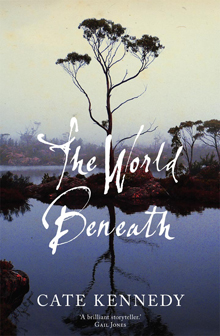The World Beneath by Cate Kennedy

Do you remember the fight to save the Franklin River in Tasmania? It was in 1983, and the start of effective environmental advocacy with recognition of the political consequences of an imbalance between development, and public concern for the environment. In some ways it led to the world paying attention to environmental issues at the scale we now have with Climate Control.
Tasmania is the backdrop for this novel by Cate Kennedy, and the main characters: Rich and Sandy, were involved in the Franklin blockade. In some ways that moment was the highlight of their lives, and they have struggled to regain the sense of purpose and identity which seemed so in perspective then.
Rich is a drifter, and finding it harder to trade on the glory of having been involved. Sandy is living on a commune with their daughter Sophie, still blaming Rich for the failure of their dreams and ideals after he walked out on them both. When 15-year-old Sophie announces that she has made contact with Rich and accepted his invitation to go on a trek in Tasmania, Sandy is horrified.
However, the trek becomes a catalyst for shaking each of them out of the torpor of their lives.
This is a fine book by award-winning short story writer and poet Kennedy. She has adjusted well to the elongated form of storytelling with descriptive contexts, plot twists, and detailed characterisation. There is already chatter about this book being shortlisted for literary awards, and Kennedy has sold the rights for publication in the US and UK.
I enjoyed reading a very Australian novel. It is a celebration of the bush, and rural characters, although not the regular farming types already portrayed in other novels. It is also a very good examination of modern disjointed family life. In some ways it is a novel about cultural gaps, but the cultures are gender and generational.
Thankfully Kennedy describes this with a deft touch. Issues such as emo lifestyle, eating disorders, Internet concerns are dealt with but not judged.
The World Beneath, is about what lies beneath the surface of relationships, as well as individual personalities, and Kennedy brings lots of issues up without providing pat answers. It is easy to recognise the tensions, the pride, the confusion, the lack of ability to articulate feelings, which characterise our relationships with those we are most familiar with.
There are some solid values demonstrated through this novel: loyalty, integrity, care, faithfulness, responsibility, forgiveness. Some of the nicest moments are lived through the minor characters: a couple who are very generous and thoughtful and eventually break through Rich's rugged individualism; a rescuer facing his own fears while risking his life for others.
I also enjoyed Kennedy's tongue-in-cheek portrayal of Sandy's hopeless searching for answers at a New Age health retreat. She desperately wants something more, but does not find the connections, or sense of a greater reality, in the gobbledy-gook of goddess guidance. In fact, it is all a distraction from honest self-contemplation.
Although the plotline is fairly predictable, which has received criticism, I found this a compelling narrative, and I was sad when it ended. The characters are not always attractive, but they draw on the reader's compassion, and I wanted to see them grow, and heal.
Before writing this novel, Kennedy visited Mexico, and had a worldview-changing experience as part of a micro-finance commune, seeing people's lives transformed. The essence of that experience comes through in The World Beneath.
In a recent interview Kennedy explains what else she learned: "Mexico taught me… that just being literate was enough,” she says. “I couldn’t imagine my life without the solace and companionship and stimulus of books but I could certainly give up writing. I also think that has made me a better writer. No one’s asked me to do it; it’s made me see writing as the privilege it should be. It’s a joyful thing."
Do we value being literate enough?
Do we substitute our own spiritual search for honest self contemplation?
Is there a place for this new genre of "domestic realism" in literature?




























